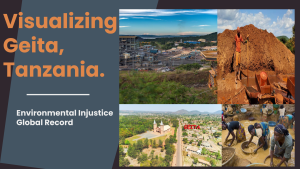Visualizing Geita
xxxx

xxxx

Emergency Response isn't directly addressed in the article. However there is one mention of emergency responders and the debriefing typically held after a traumatic event/call. But, the article also says that this method is not actually effective in preventing psychopathology, and can actually hinder the healing process by promoting exposure to traumatic memories.
This article was published throught the National Institute of Public Health's Public Access database. The NIH makes all of the peer reviewed articles and studies that it funds available to the public on this platform "to advance science and improve public health."
I tried all three apps:
I've-Been-Violated allows you to put in your name, phone number, and email, read instructions, and take a video recording in three steps.
We-Consent was confusing as I only got the camera screen and couldn't turn it off without exiting the app.
What-about-no wouldn't send me a confirmation email so I couldn't log in :(
I followed up on the history of PTSD, Mental illness in the Fire, Police, and EMS services both in disasters and in normal functions, and i looked at existing policies designed to minimize the trauma associated with disaster put in place by organizations such as FEMA and ARC.
The production and continued maintenance is paid for by hospitals and foundations partnered with the app developers.
The program was created in reaction to the disaster at Fukushima-Daiichi, with influence of the lessons learned post-bombing in Hiroshima. Hiroshima University specializes in radiation casualty medicine and works to improve medical care in response to nuclear emergencies. This program was specifically made to generate leaders capable of directing relief efforts while keeping the clear goal of reconstruction post-disaster.
"The real challenge of a disaster involving nuclear facilities, however, lies in how to handle the unexpected, unpredictable, utterly novel, and barely intelligible chain of events unfolding in real time."
"...existing organizations with subject expertise have negligible international autority and often ave problematic rapport with general public, and confirm the need for a well-coordinated and integrated sociotechnical approach."
"Ellis clearly realized that a nuclear disaster response team would face tremendous challenges on the international level. He emphasized it would be necessary 'to find the sweet spot between national sovereignty and international accountability.'"
The author, Sonja D Schmid, is an assistant professor at Virginia Tech. She specializes in knowledge of the nuclear industries in the Former Soviet Union and Eastern Europe. She uses this knowledge to analyze energy policy and nonproliferation efforts. She is well versed in disaster response, having interviewed a number of members from the Soviet nuclear industry, using their first-hand accounts of the response efforts in the wake of the Chernobyl disaster to guide her.
Artisanal or Snall Scale Mining in Geita.